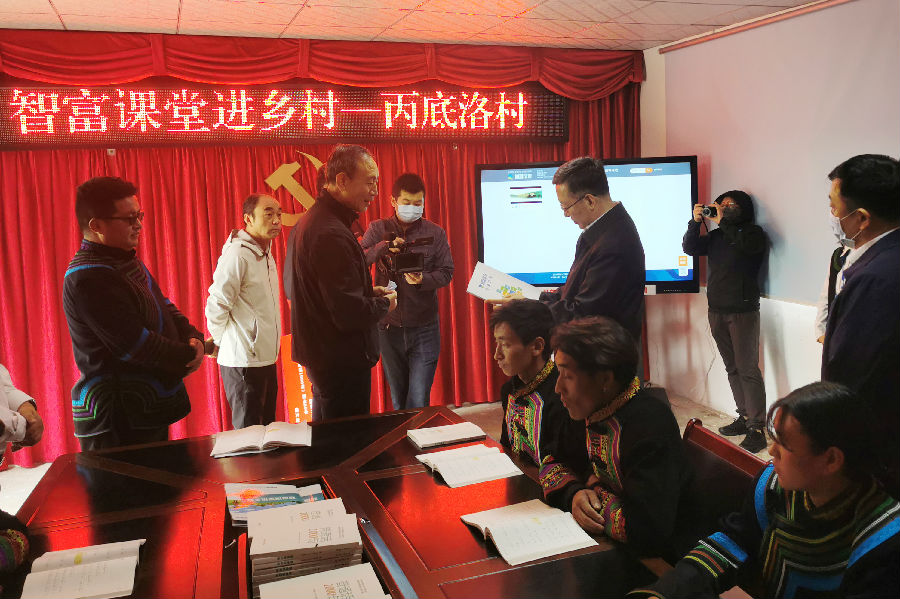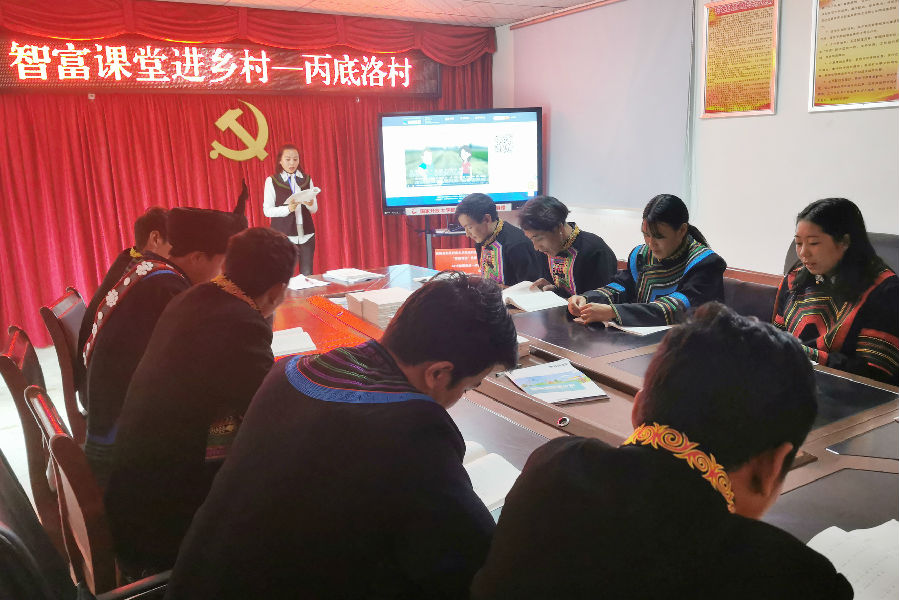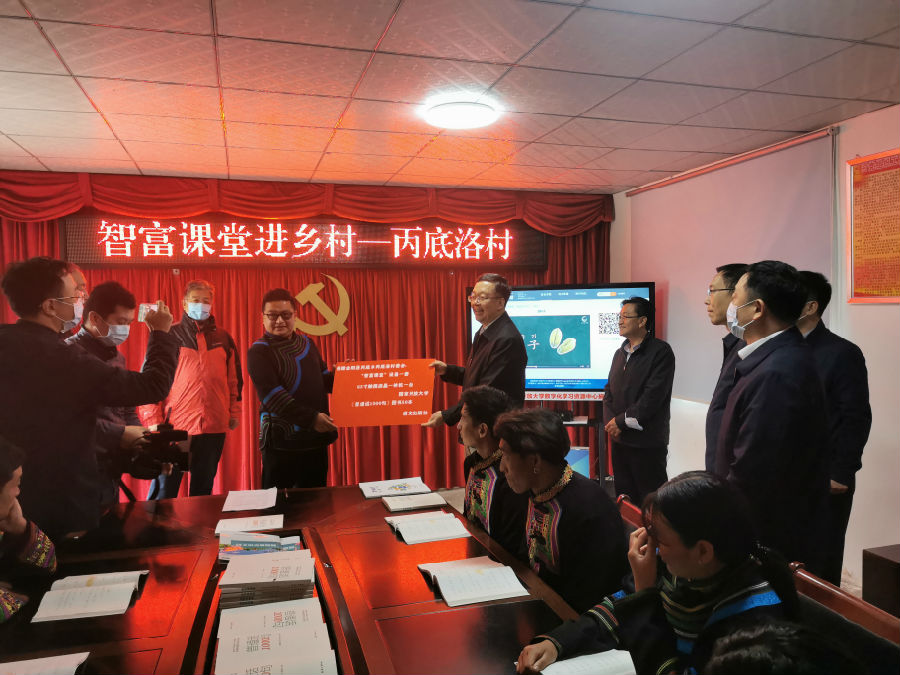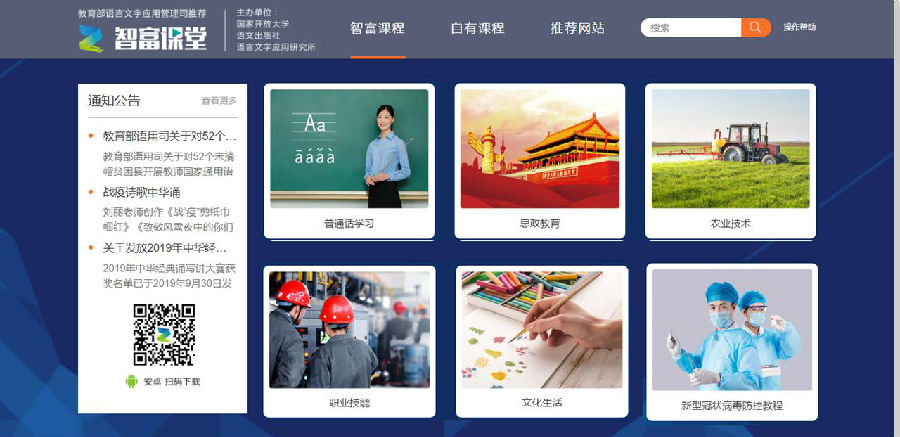 On 17 September 2020, Tian Xuejun, vice minister of the MOE and director of the State Language Commission, investigating “poverty alleviation through education” in Bingdi Township, Jinyang County, Sichuan Province, attended an IT-based class designed to promote the use of Mandarin in the countryside. He was accompanied by OUC vice president Ju Chuanjin, intending to learn more about the promotion of Mandarin and the use of the class in doing so.
On 17 September 2020, Tian Xuejun, vice minister of the MOE and director of the State Language Commission, investigating “poverty alleviation through education” in Bingdi Township, Jinyang County, Sichuan Province, attended an IT-based class designed to promote the use of Mandarin in the countryside. He was accompanied by OUC vice president Ju Chuanjin, intending to learn more about the promotion of Mandarin and the use of the class in doing so.


Mr. Tian and local villagers took a class together in order to witness a demonstration of the technology and resources. He told the villagers: "I hope you learn Mandarin well; make good use of the technology and these resources to enhance your skills; and lift yourselves quickly out of poverty."
Ju Chuanjin introduced the development of the programme, which consists of a package of digital resources that not only includes Mandarin-instruction videos, but also instruction in ideology and politics, vocational skills, agricultural technology, and animal husbandry. While promoting Mandarin, it provides villagers with skills that will help bring them wealth.
In order to address the lack of networks and learning resources in low-income areas, the OUC, under the guidance of the Department of Language Application and Administration of the Ministry of Education, has taken the lead and collaborated with the Language & Culture Press and the Institute of Applied Linguistics of the Ministry of Education to implement the programme. It focuses on 52 low-income counties and selected ethnic-minority villages where the promotion of Mandarin as part of this pilot programme has been demanded. Since the implementation of the programme in September 2020, it has been carried out in 86 villages in 18 counties inhabited principally by ethnic minorities.
The programme integrates Internet transmission, local storage, and wireless-hotspot mobile-phone services with the popular text 1,000 Mandarin Chinese Sentences to deliver high-quality instruction to grassroots cadres, to classroom where young and middle-aged farmers and herders are intensively trained, to the mobile phones of villagers, and via radio broadcasts to farmers working in their fields. Vocational skills training and the promotion of Mandarin are delivered simultaneously to integrate poverty alleviation with intellectual growth.
Bingdiluo Village is located in the northwest of Jinyang County, and has an average elevation of 2,400 meters. It is an alpine region inhabited by the Yi ethnic group. In order to help the county promote Mandarin and alleviate poverty, the OUC donated equipment to preschool-education centres in Bingdiluo and Baogushan Villages (affiliated to Bingdi Town), including a 65-inch touch-enabled LCD all-in-one machine on behalf of the programme. The Language & Culture Press, meanwhile, donated 50 copies of 1,000 Mandarin Chinese Sentences to Bingdiluo Village.
Ms. Luo Yan, the liaison for Mandarin promotion in Bingdi Town, said that “the curriculum resources are very pragmatic and address the issue of insufficient resources and courseware for Mandarin instruction. The resources include vivid videos and pictures, piquing the interest of the villagers in learning Mandarin.”
According to Party secretary of the village, Rihuo Xiaodong, “The main sources of income in the village are farming and migrant work. Most of the young villagers are migrant workers, and they have some basic Mandarin, while the seniors hardly understand, much less speak it."
Xie Amu, secretary of the Disciplinary Committee of Bingdi Town and the first secretary of Bingdiluo Village, was excited to see the new resources. "These resources are so rich! They will be used by the cadres in the poverty-alleviation programme. We will make sure the villagers work hard on their Mandarin, and I too will study carefully, especially about planting Chinese medicinal herbs."


By Yu Zhangli, OUC